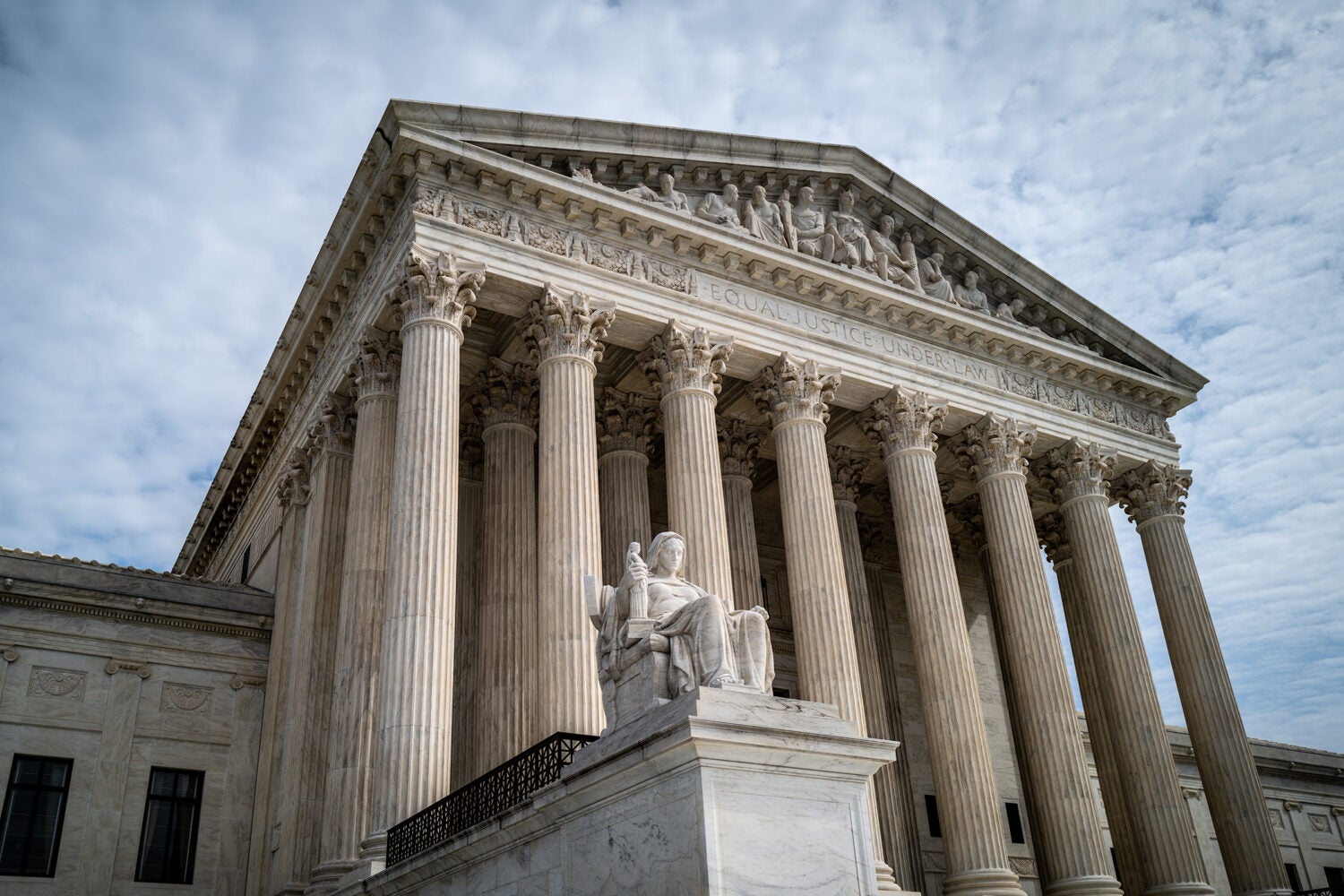Does a person with a domestic violence restraining order against them have a Second Amendment right to own a gun?
On November 7, the Supreme Court will hear oral arguments in United States v. Rahimi, a case that could have implications not only for a federal law concerning people with restraining orders — but potentially many other gun control measures across the country, says Mark Tushnet, the William Nelson Cromwell Professor of Law, Emeritus at Harvard Law School.
At the center of the controversy is a Texas drug dealer named Zackey Rahimi with a history of violence. In 2020, a court issued Rahimi’s girlfriend a restraining order against him and forbid Rahimi from owning a firearm. He soon defied the court’s order to stay away from the woman, then committed a litany of unrelated shootings, which eventually culminated in his arrest. He was charged with violating a federal law that prohibits someone with a domestic violence restraining order from possessing a gun — a law Rahimi says infringes on his Second Amendment rights. The case follows on the heels of another pivotal gun rights decision from the Supreme Court — New York State Rifle & Pistol Association, Inc. v. Bruen — which last year struck down as unconstitutional a longstanding New York concealed carry law.
In an interview with Harvard Law Today, Tushnet explains what happened in Bruen, how it is likely to influence the current case, and why a decision in favor of Rahimi could unleash a wave of litigation against popular gun control measures.

Harvard Law Today: What is this case about?
Mark Tushnet: There’s a federal statute that makes it a crime for someone who is subject to a civil domestic order of protection to possess a weapon. Domestic orders are issued by state courts when they find that the person poses a potential threat of violence to a domestic partner. If you are under such an order, then you cannot possess a gun. Rahimi is under such an order. He’s got a pretty unsavory background of violence directed against intimate partners. He disputes the facts underlying the domestic order that he’s currently under, but it was entered by a state court, and he’s covered by the federal statute.
HLT: At first, the Fifth Circuit Court of Appeals upheld the constitutionality of the federal law in question here. But then the Supreme Court decided New York State Rifle & Pistol Association v. Bruen, which prompted the Fifth Circuit to withdraw its previous decision and strike down the law. What did the Supreme Court say in Bruen?
Tushnet: First, let me give a little background. In earlier cases [District of Columbia v. Heller and McDonald v. City of Chicago], the Supreme Court has held that the Second Amendment protected an individual’s right to own a gun for purposes of self-defense. But both of those cases involved complete prohibitions. They were easy cases — if there is a right, then, with modest exceptions, you can’t say no one can own a gun. But the Court didn’t say what the general test for regulations was going to be, and it fumbled around for several years before deciding in the Bruen case to clarify what the standard was.
What it said in Bruen was that the only kinds of permissible regulations of gun ownership were those that existed at the time the amendment was adopted — that is, 1791, or for state cases, 1868. So, for a federal gun regulation to be permissible, it has to have been in place in 1791 or “closely analogous” to regulations that were in place in 1791. What Bruen said is that lower courts have to look at the historical record and see if there were regulations like the one in question or closely analogous to it in 1791. Here, the Fifth Circuit looked at that record and decided that no, it didn’t see anything similar, so the federal statute is unconstitutional.
HLT: What does it mean that the Fifth Circuit invalidated the federal law “on its face”?
Tushnet: Again, Rahimi himself is quite an unsavory character, so if you’re going to say that this law applies to anybody, it’s going to apply to him. So, by invalidating the law on its face — that is, that it’s unconstitutional no matter who it is applied to — they don’t have to say “well, it’s particularly bad to deny this specific person access to a gun,” because it clearly isn’t particularly bad to deny Rahimi access to a gun, given his history.
HLT: What are each of the sides arguing here?
Tushnet: In the earlier gun cases, the Court said, “Look, the Second Amendment protects the right to own a gun, but there are historical restrictions on that right. In particular, we aren’t challenging laws that deny those who are not ‘responsible and law-abiding citizens’ from owning guns.” There are lots of laws that say that if you have been convicted of a violent felony, you can’t own a gun. The Court didn’t cast doubt on those statutes.
The federal government here says, “Someone who is under a domestic order of protection is not a responsible and law-abiding citizen.” The fact that such an order has been entered shows that a state court found this person to not be responsible. The U.S. government is saying to the Court, “You said before that it was okay to deny guns to people who weren’t responsible and law-abiding, and that’s all that this statute does.”
HLT: How does Rahimi counter that?
Tushnet: Rahimi argues that the government is describing what the Court talked about before in terms that are too general. You have to look not at the general terms “responsible and law-abiding,” but the actual regulations in place. And when you look at the actual regulation in place, you can’t find a comparable regulation denying people guns when they were subject to civil orders of protection in 1791.
Rahimi says that you have to look at the kinds of regulations that identify who were “responsible, law-abiding” people. And here, his strongest argument is that he is subject to a civil order of protection. Nobody in this case has found that he is not law-abiding. The lower court made a prediction that if he had a gun, there’s a decent chance that he would use it as part of his ongoing course of domestic abuse. But it didn’t find out he had done so. He hadn’t been convicted of a domestic abuse crime. So, his lawyers say that, in the posture of this case, he’s a law-abiding citizen.
Then we move on to what it means to be “responsible.” Rahimi’s lawyers argue that “responsible” means that he is just like everyone else. Anyone who has access to a gun can sometimes use it badly, but unless you know something about the particular person, you have to treat Rahimi like everybody else.
HLT: How does the government respond to those arguments?
Tushnet: First, the government argues that if you look at regulations in place in 1791, there were things sort of like domestic orders of protection. There were surety bonds; that is, if you were found liable for a fault, you could be required to put up a bond, and some of those surety bonds included provisions saying you couldn’t keep a weapon.
The government also goes through a whole list of regulations that take away guns from people who had not been convicted of crimes. The strongest example they had is that people who had been Loyalists during the Revolution were denied access to guns, even though they hadn’t been found guilty of any offense. But they were people who the government regarded as not “responsible” because they had sympathized with the British. Rahimi’s lawyers say, “well, they were traitors.” But that’s not really accurate, because they had not been found liable for treason.
HLT: In your view, how will the Court think through this case? How might Bruen influence its decision?
Tushnet: They’re going to look at what lawyers call the “level of generality” question. Will they say Congress can use some degree of judgment to determine what counts as a “responsible and law-abiding” citizen today, or will it ask a more specific question about statutes from 1791 and shortly thereafter? That’s the question that arises out of Bruen.
The other thing that needs to be on your mind are the consequences of deciding in favor of Rahimi in particular. The approach Rahimi says the Court should take would really put into question a large swathe of well-established regulations on gun ownership.
Just as an example, the federal statutes prohibiting felons from owning guns dates back only to 1938. In terms of the historical analysis, it’s a relatively recent statute. Maybe that means the “felon in possession” statute is unconstitutional. Deciding for Rahimi would open up a very large number of questions about statutes that most people in this country think should be upheld.
HLT: Could you expand on what might happen if the Court decides in favor of Rahimi?
Tushnet: There is going to be a lot more litigation. The nonviolent “felon in possession” statute would almost immediately come into play. If the Court rules for Rahimi, Hunter Biden might have a decent case that it’s unconstitutional to deny him access to a gun simply because he’s a drug addict, and therefore it’s unconstitutional to penalize him for saying he wasn’t a drug addict when he bought the gun. Take Martha Stewart — should she be prevented from owning a gun, even if she committed a nonviolent white-collar crime like securities fraud? Suppose Sam Bankman-Fried is convicted — would he be allowed to own a gun?
HLT: And what happens if the Court upholds the law?
Tushnet: There still will be litigation, but if the Court rules for the government, it is likely to say that contemporary legislators have fairly broad power to determine what counts as being “responsible and law-abiding” citizens. They’ll say, “Look, you can’t take guns away from people if they’re convicted of littering, or for not putting their recyclables in the right place.” They’re not going to say legislatures can do that. But they may say that if the legislature makes a reasonable judgment that the behavior that triggers the gun possession ban is bad enough, a ban on gun possession should survive a challenge.
